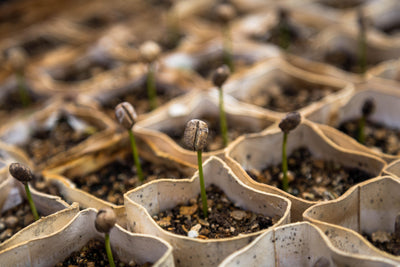Eco travelling: An Easy to Follow Guide
23 August, 2021Seeing new parts of the world is one of life’s great joys. It gives us a chance to encounter new cultures, see new landscapes, and meet new people. However, as with all areas of life, our travelling leaves a carbon footprint. This means that it is important to take steps to minimize the harmful effects of travel as much as possible. To help, this article will offer some guidance on the increasingly important topic of eco travelling.
What Is Eco Friendly Travel And Why Is It Important?
Simply put, eco travel is about trying to mitigate the carbon footprint of your vacation. This means considering the impact of every aspect of your holiday. The destination you choose, your transport, your activities while you’re there. All of these decisions, and more, contribute to how much environmental harm you’re causing.
This is important because our travels contribute to the developing climate crisis. For instance, the carbon emissions caused by airplanes alone are a serious problem. What’s worse, they are projected to triple in volume by 2050.
To help save our planet, we need to start making our vacations as green as possible. Some simple and actionable steps that you can take in this regard are outlined below.

Choose A Green Travel Destination
The most sustainable way of vacationing is doing it as close to home as possible. Consider going for a camping holiday or hiring a cottage by the seaside. However, if your heart is set on travelling further afield, pick a green destination. To find one, browse through the 2021 Sustainable Top 100 Destination Award Winners.
These are locations that are doing their best to protect their ecosystem. Additionally, they are implementing efforts to combat climate change in general. Good examples of countries doing this are Japan, Australia, Romania, and Rwanda.
Choose Eco Accommodation
There are now eco-conscious booking portals available to help locate greener accommodation. Sites such as bookdifferent.com provide calculations of your booking’s carbon footprint. This is based on several factors, such as the direct energy use of the accommodation itself.
Of course, how green your accommodation is depends in large part on your own behavior. For instance, having unnecessarily long showers will increase your carbon footprint. So will leaving on your lights or air-conditioning when they’re not needed. Try to act in as green a manner as you would at home.
Choose A Green Mode Of Transportation Or Direct Flights
As mentioned, air travel is a particularly harmful form of transport. However, if you have to travel by plane, choose a direct flight. This reduces the total distance traveled by air. As such, it cuts down on the overall carbon footprint of your journey. It is also worth bearing in mind that airplanes use more fuel when ascending and descending. This means that the shorter the distance you fly, the less efficient the journey. When you have less distance to cover, consider taking a train or coach instead.
In fact, if taking a train is a possibility this is always the best option. Experts agree that this method of transport causes the least amount of greenhouse gases. This is true for both electric and diesel-powered models. Additionally, trains provide an opportunity for luxurious and relaxed travel. You can enjoy the rolling landscape, relax, and start your vacation feeling rejuvenated as a result.
Travel Light
The less you pack for your holiday, the smaller your carbon footprint. This is because you will be reducing the payload of the vehicle. A smaller payload means less fuel usage and thus lower carbon emissions.
To achieve this, think strategically about what clothes you are likely to need. For example, if you’re headed to a tropical beach, you’re unlikely to need a warm jacket. Only pack items that you are sure you’re going to wear. At the same time, it’s likely that your vacation outfits will get dirty and need to be washed frequently. Accordingly, it’s wise to bring clothes that are rugged and durable.
There are other ways you can reduce the weight of your luggage. For instance, rather than taking books with you, take a kindle or a tablet. Further to this, try to think of other ways you can reduce the weight of your luggage too.
Use E-Tickets
Using digital tickets means that you’re not contributing to deforestation. It’s now very easy to use e-tickets via your smartphone or tablet. All airlines have their own apps to facilitate this.
Bring Your Own Personal Care Products
The single-use toiletry products that many hotels supply are terrible for the environment. They have a high packaging-to-product ratio, and often aren’t biodegradable. This is why it’s important to bring your own personal care, hygiene, and grooming items. Make sure you only pack reusable and sustainable options.
Products such as LastTissue and LastSwab can be brought with you and reused as you travel. This can save you from producing significant amounts of plastic waste. Similarly, bring your own zero-waste shampoo, soap, and conditioner in reusable containers. If your hotel offers single-use toiletries, urging them to adopt zero-waste policies in your feedback could go a long way.
Don’t Use Hotel Buffets

While hotel buffets may seem very inviting, ordering from the menu is much less wasteful. This is because hotel buffet-systems generate staggering amounts of food waste. The New York Times has revealed that only half of the food placed into buffets is actually eaten by guests. Of the remaining food, only 10 – 15% can then be donated or reused. The rest is just thrown away.
Hotels operate in this counter-intuitive fashion to remain competitive. One of the main factors in guests’ decisions on where to stay is the breakfast buffet. Because of this, hotels feel pressure to maintain this wasteful cycle. To avoid contributing to this problem, give the buffet a miss.
Eat And Drink Locally
So, if the hotel buffet isn’t a sustainable dining option, what is? Your best bet for eating in an eco-friendly way is to do it locally. This doesn’t mean frequenting the McDonalds or Starbucks in the town where you’re staying. It means finding local businesses that purchase ingredients from nearby vendors. This will dramatically reduce the carbon footprint of your meals. At the same time, you will be supporting the local economy.
A fun way of approaching this is to seek out the area’s traditional dishes. These will often be created using locally sourced ingredients. It allows you to experience the local culture while reducing your environmental impact. Street vendors, for example, frequently offer cheap local food, often with vegetarian options. In the same vein, trying local beers or wine when you go for a drink are another great way to step up your eco friendly travel efforts.
Quit Single Use Plastic
Single-use plastic is contributing to a global-scale catastrophe. It's extremely important to replace these items with reusable or sustainable alternatives. One of the worst offenders for vacationers is plastic water bottles. Avoid these, and bring your own reusable bottle instead.
If you’re heading to a destination that is known to have water impurities, then you should also bring a purifier. There are also a number of water bottles available that have inbuilt filters that can also purify water for you.
Bottled water isn’t the only single-use plastic often used on holidays though. Bring a set of reusable cutlery with you, rather than using plastic disposable ones. Similarly, avoid plastic straws by bringing a metal reusable one.
Plastic bags are another blight upon the environment. Bring a tote bag or other lightweight reusable bag to avoid having to use these particularly bad environmental offenders. You could also take a small reusable container for snacks, to cut down on plastic packaging while you’re out.
Follow Local Recycling Rules
At home you put effort into sorting your recycling according to your area's rules. Going on holiday doesn’t mean you should stop doing this. While it might take a bit of effort to learn the local recycling rules, it’ll reduce your carbon footprint.
To make it easier, you can ask your hotel if they have a specific system in place. Similarly, Airbnb hosts should be able to help explain the local rules.
Use Your Destination’s Public Transport System
Many people relish the freedom of renting a car while they’re on holiday. While this does provide a great deal of freedom, it comes at a cost. Cars are terrible for the environment. Using them throughout your holiday significantly increases your carbon footprint.
Where possible, it’s much better to opt for the local public transport system. These are much greener methods of travel. Of course, there are even more eco-friendly options. Do some research to find out about hiring bikes or boats. Alternatively, just walking will be good for the planet, your wallet, and your health.
Offset Your Carbon Emissions
Another way of lessening your carbon footprint is to offset your carbon emissions. This means calculating the emissions you’re creating and donating the monetary value. There are free calculators available online to help you work this out. You can then donate the money to an appropriate environmental charity. Examples of these include carbonfund.org and zerocarbonworld.org.
Eco Travelling: The Future Of Vacationing
Armed with this information, you should now be better positioned for eco travelling! There’s no reason you can’t still have exciting and relaxing holidays. You’ll at least benefit from having the knowledge of how you can minimize your carbon footprint where it’s practical to do so.
MORE Going Zero Waste ARTICLES View all ›
Ready to make
the switch?
- Powerful Cleaning
- Dissolves Easily
- Skin-Friendly
- Eco-Friendly
- No Mess














